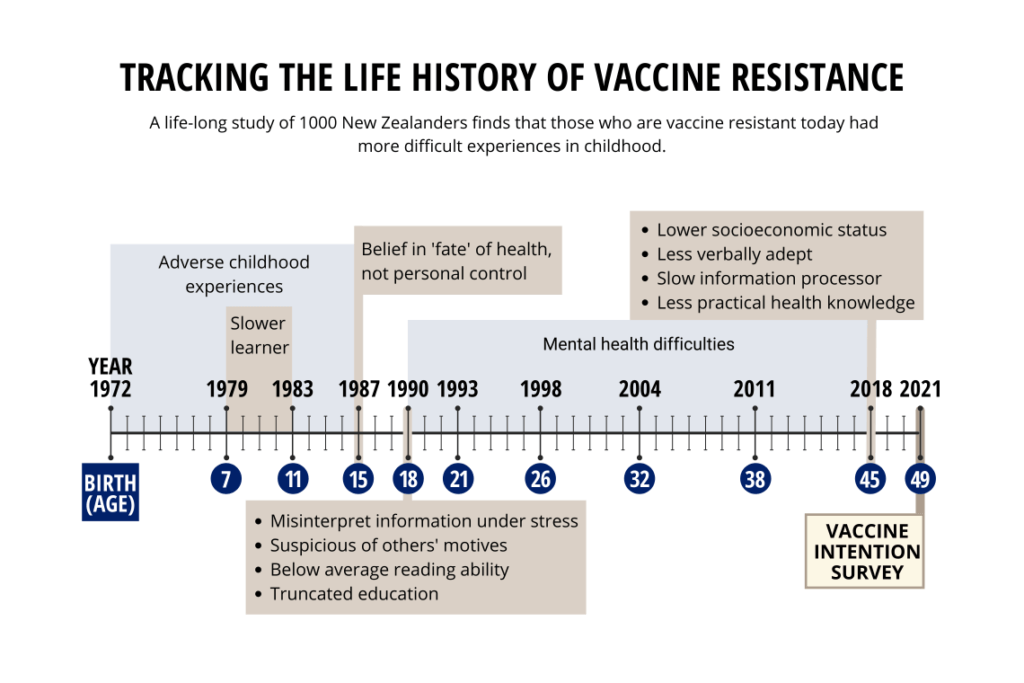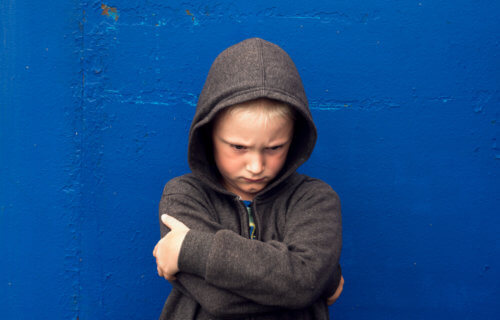DURHAM, N.C. — Are recent politics really to blame for the widespread resistance to the COVID-19 vaccine? A new study suggests that the real answer may go much deeper than people think. Researchers from Duke University say the passionate opposition to vaccinations and policies like mask mandates can trace its roots back all the way to a person’s childhood. Their study claims that growing up in an atmosphere of mistrust leads to these attitudes later in life.
“We had so many friends and family who initially said that the pandemic was a hoax, and then refused to wear a mask or social-distance, and kept singing in the choir and attending events,” says study senior author Terrie Moffitt in a university release.
“And then when the vaccines came along, they said ‘over their dead bodies,’ they would certainly not get them,” adds Moffitt, Duke’s Nannerl O. Keohane University Distinguished Professor of Psychology & Neuroscience. “These beliefs seem to be very passionate and deeply held, and close to the bone. So we wanted to know where they came from.”
‘Don’t trust the grownups’
Researchers used data from the Dunedin Multidisciplinary Health and Development Study, which has been tracking nearly all of the 1,000 people born between 1972 and 1973 from a single town in New Zealand. Researchers have been measuring each person’s social, psychological, and health factors since childhood — giving scientists insights into how these early years impact adulthood.
Study authors conducted a special survey of the group in 2021 to examine each participant’s stance on the COVID-19 vaccine before the shots became available in the country. The team then matched each person’s responses to the records on their upbringing and personality over the years.
Results show that, 40 years ago, respondents who are now vaccine-resistant or express vaccine hesitancy had more adverse childhood experiences than others. These include incidents of abuse, neglect, threats, and other hardships such as poverty.
“That suggests to us that they learned from a tender age ‘don’t trust the grownups,’” Moffitt says. “If anyone comes on to you with authority, they’re just trying to get something, and they don’t care about you, they’ll take advantage. That’s what they learned in childhood, from their experiences growing up at home. And that kind of learning at that age leaves you with a sort of a legacy of mistrust. It’s so deep-seated that it automatically brings up extreme emotions.”

The timeline of mistrust
Researchers were able to work out a timeline of the experiences that led many to now show a lack of trust in pandemic safety measures. According to their findings, the effect of childhood trauma can start to show in children as young as seven years-old.
“The mistrust was widespread, extending not only to institutions and influencers, but also to family, friends and co-workers,” the researchers write.
“You just think of what a long shadow that casts,” adds co-author Stacy Wood, the Langdon Distinguished University Professor of Marketing at North Carolina State University. “If your trust is abused as a child, later on, four decades later, you still don’t trust. That’s not trivial. I’m not going to get around that with a cool campaign or a celebrity endorser.”
Between the ages of 13 and 15, vaccine-resistant individuals were more likely to believe that their health was out of their control. By 18, these people were more likely to shut down under stress. They became more alienated and aggressive in these situations. Teens who grew up to become vaccine-resistant were also more likely to value their personal freedom more than others and shun social norms.
Unfortunately, the team also found that these individuals scored lower on tests measuring mental processing speed, reading level, and verbal ability during childhood. Prior to the pandemic, at age 45, the vaccine-resistant group displayed less knowledge about everyday health topics and practices. The team notes that these results did not change when researchers factored in each person’s socioeconomic status — meaning wealth did not change their attitudes or knowledge about health.

Healthcare workers shouldn’t take it personally
Wood, a marketing professor who specializes in health messages, says healthcare workers who have been confused and even angry at people for not taking their advice during the pandemic should wait before judging someone too harshly.
“Doctors and hospitals have been asking us ‘Why would people be so resistant? Why can’t we convince them with data?’” Prof. Wood explains.
“The root of this is, you can’t change this as a healthcare provider,” Wood continues. “And it’s not about you. It’s not a diminution of your service and your warm intent.”
The researcher adds that the pandemic triggers an ancient response in many people, which makes them feel they need to fight to survive.
Moffitt cautions that the results only come from one specific group of people and their self-reports on their vaccine intentions. To get a better picture of this link to childhood influences, the team says they’ll need to look at a larger group of people from multiple countries. However, the researchers say there are some lessons to take away from this study.
“Preparing for the next pandemic has to begin with today’s children,” says co-author Avshalom Caspi, the Edward M. Arnett Distinguished Professor of Psychology & Neuroscience at Duke. “This isn’t a contemporaneous problem. You can’t combat the hesitancy and the reluctance with adults who have been growing up to resist it their entire lives.”
“It’s also the case that pro-vaccination messaging is not operating in a vacuum,” Moffitt concludes. “It’s competing against the anti-vax messaging on social media. The anti-vaxxers are winding people up with mistrust and fear and anger. It creates a situation where their audience is very distressed and upset and then can’t think clearly. They’re manipulating emotions, which reduces cognitive processing.”
The study is published in the journal PNAS Nexus.

Has NOTHING to do with childhood mistrust and EVERYTHING to do with the lying fake news, Fauci, CDC and FDA! Dr Malone who invented the mRNA that’s in the vaccine says its deadly and not to take it, so instead of Chris at Study Finds reporting on the lies and deceptions of those who destroyed our country and caused the murder of millions, he posts this trash article.
Bob I totally agree. And When they accuse me of being scared of needles or not protecting others I just show them my blood donation card.
Game, set, match.